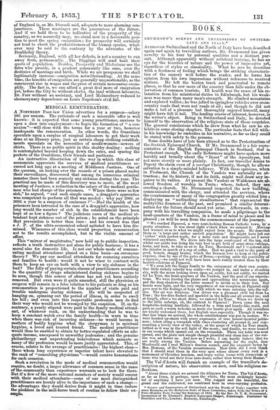MEDICAL REMUNERATION.
A Norivcsas Poor-law Union advertises for a surgeon—salary 201. per annum. The rationale of such a miserable offer is well known : it is expected that some young practitioner, anxious to open a door into employment—to begin the formation of " a con- nexion "—will close with the terms for a year or two, however inadequate the remuneration. In other words, the 43-utadians speculate upon a surplus of surgical labourers to get their work
done at an illusory price, just as certain cheap clothing establish- ments speculate on the necessities of needlewomen—sewers of shirts. There is no public spirit in this shabby dealing : nothing is contemplated beyond keeping down the rates, and sparing the pockets of the Guardians, their friends and partisans.
An instructive illustration of the way in which this class of economists appreciate the services of -medical practitioners oc- curred not long ago at a meeting of Middlesex Justices. One of
the quorum, on looking •over the records of a prison placed under their surveillance, discovered that among its numerous criminal inmates there had been scarcely any sickness during the year. The practical use he made of this discovery was to •move, at the next meeting of Justices, a reduction in the salary of the medical gentle- man who had charge of the prisoners. " Where there were so few sick," he argued, " and such simple cases, a druggist's apprentice was competent to perform all that was needed : why pay 2001. or
3001. a year to a surgeon of eminence ?"—Had the health of the prisoners been intrusted to the care of a druggist's apprentice, how long would the number of sick in the establishment have been kept at so low a figure ? The judicious cares of the medical at- tendant kept siokness out of the prison ; he acted on the principle that prevention is better than cure : and his reward was that a J. P. of the ultra-economical school agitated to have him dis- missed. Wiseacres of this class would proportion remuneration not to the results accomplished, but to the -visible amount of effort.
This "mirror of magistrates," now held up to public inspection,
reflects a truth instructive not alone for public business ; it has a moral also for domestic life. Is not our whole mode of remune- rating medical attendance placed on a false basis—an erroneous theory P We pay our medical attendants for restoring ourselves and families to health : would it not be wiser to contract with them to keep an eye on both with a view to nip sickness in the bud The folly of paying certain classes of practitioners according to the quantity of drugs administered during sickness begins to be seen, though this source of abuse has not yet been entirely removed. But even were it quite amended, still the physician or surgeon will remain in a false relation to his patients so long as his remuneration is proportioned to the number of visits paid and trouble undergone during sickness. He will be suspected of hanging on, spinning out the period of illness, in order to swell his bill ; and even into this respectable profession men do find their way who would not be wronged by the suspicion. If, on the contrary, a yearly stipend were paid to the family medical attend- ant, of whatever rank, on the understanding that he was to keep a constant watch over the family health—to warn in time when there was risk of incurring sickness—he would become in matters of bodily hygiene what the clergyman is in spiritual hygiene, a loved and trusted friend. The medical practitioner would thus be enabled to obtain by better-regulated efforts an ade- quate income, unexposed to unworthy jealousies ; and the genuine philanthropy and unpretending benevolence which animate so many of the profession would be more justly appreciated. This, of course, relates to the average of practitioners : the highest class— those whom long experience or superior talent have elevated to the rank of "consulting physicians "—would receive honorariums for each occasion.
Such a revolution in the mode of medical remuneration would require, no doubt, a larger allowance of common sense in the mass of the community than experience warrants us to look for there. But if a few of the more rational members of society would concur with their medical attendants—some of our most distinguished practitioners are keenly alive to the importance of such a change— the advantages they would derive from it might in time induce the plodders in the mill-horse track of routine to follow their ex- ample.


























 Previous page
Previous page